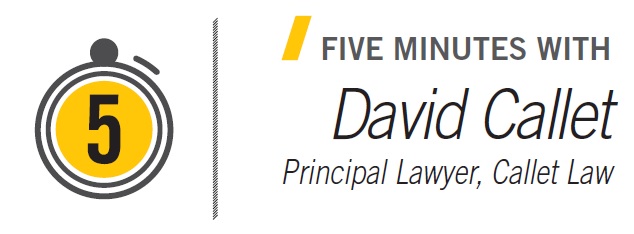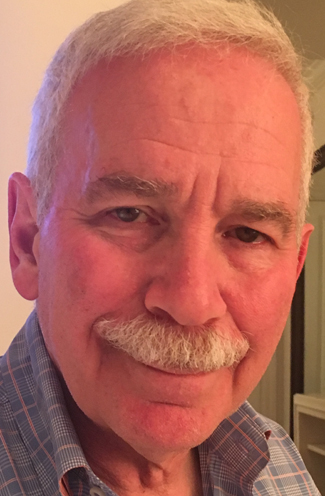Five Minutes With: David Callet, Principal Lawyer At Callet Law


Nowadays, David Callet, lawyer and consumer product safety compliance expert, is being asked about greenwashing more than ever. “My clients are wanting to avoid these claims and they want to know whether or not what they’re saying is challengeable,” Callet says. “More often than not, I ask: ‘What are the facts? Do you have evidence to support what you’re saying?’”
The term “greenwashing” was coined by prominent environmentalist Jay Westerveld in a 1986 essay. He claimed the hotel industry falsely promoted the reuse of towels as part of a broader environmental strategy, when, actually, it was designed as a cost-saving measure. Today, greenwashing is still used to describe outrageous corporate environmental claims.
 It’s a topic that will only become more prevalent. “Increasingly, consumers want to buy products that are, let’s say, eco-friendly,” Callet says. “The studies are clear that the demand is on the rise. Moreover, a lot of consumers are willing to pay a premium for these products.”
It’s a topic that will only become more prevalent. “Increasingly, consumers want to buy products that are, let’s say, eco-friendly,” Callet says. “The studies are clear that the demand is on the rise. Moreover, a lot of consumers are willing to pay a premium for these products.”
A recent report found that consumers of all generations are now willing to pay more for sustainable products. Today, nearly 90% of Gen X consumers said that they’d be willing to spend an extra 10% or more for sustainable products, compared to just over 34% two years ago.
Callet says, “Sellers want to get into this market. Then, you get the folks who are in advertising and marketing who may be pushing the envelope too far in terms of what they’re saying about the products. It could be saying something that’s false. More often, the issue arises over something that’s misleading and confusing. When that occurs, that’s greenwashing.”
The Federal Trade Commission Act, section 5, prohibits unfair or deceptive acts or practices affecting commerce. “It doesn’t say anything about greenwashing,” Callet says. “It says you can’t sell products making false or misleading claims. They’re not specific to environmental acts, but they could be.”
There’s also the 'Green Guides,' published in 2012. Callet says the FTC intends to update these guides every 10 years, potentially covering new topics like carbon neutral claims in more detail. “The Green Guides give guidance on what they believe the average consumer would conclude based on what you say,” he says. “Based upon research, the FTC believes this is what a consumer would understand. And you don’t have to use words to make a false or misleading statement about your product.”
PPB spoke with Callet to learn more about avoiding greenwashing.
PPB: What guidance do the Green Guides offer?
Callet: Clearly, what you say about a product can’t be false. But it also can’t be misleading, deceptive and overstated. For example, you can’t say a product is recyclable when only 20% is. That’s an overstatement. Next, it says, if you’re going to make a claim based on science or fact, you need to have “competent and reliable evidence.” It can’t just be because you said so. Someone must be qualified to say, for example, a product is energy efficient and have data to back it up.
Another component is it must affect the buy decision, and as I said earlier, this is likely to affect the buy decision because consumers are increasingly interested in these products.
PPB: What responsibilities do distributors have when selling a product that’s been greenwashed?
Callet: Distributors have purchase agreements with suppliers and those agreements may or may not speak to who’s liable for what. Even if a distributor is ultimately liable, in any product lane, the manufacturer, supplier or distributor can all be sued.
But let’s analogize distributors to retailers. A retailer puts a product with an environmental claim on their shelf and they don’t say anything about the product other than what the manufacturer said, that retailer is likely not liable. But if the retailer, in this case the distributor, promotes the product, repeats the claim and makes the claim part of its marketing, they are potentially responsible. In the promo industry, it’s more likely for distributors to repeat suppliers’ claims. But distributors could have a contractual agreement with suppliers.
PPB: How can distributors verify a product’s environmental impact?
Callet: A distributor who’s doing their due diligence could ask the supplier for the competent and reliable evidence to decide. If you have a good relationship with a supplier and you’ve done business for years, you rely upon them and you have reason to. But on the other hand, there’s some liability that can flow through the entire distribution chain.
PPB: How can suppliers avoid unintentional greenwashing?
Callet: You don’t have an unintentional greenwashing claim. It only arises when you say something about your product that was either false or misleading. You can’t sleepwalk into a greenwashing claim.


The EcoStand is made from a blended compound of 65% recycled ABS plastic and 35% wheat straw. Set down a phone on the EcoStand to keep an eye on notifications, watch videos or take video calls handsfree. The EcoStand even accommodates charging cords. A portion of the product is biodegradable and comes in 100% recyclable packaging. For every order, PowerStick.com will plant a tree in partnership with non-profit, One Tree Planted.
PowerStick.com / PPAI 383252, S8 / www.powerstick.com

